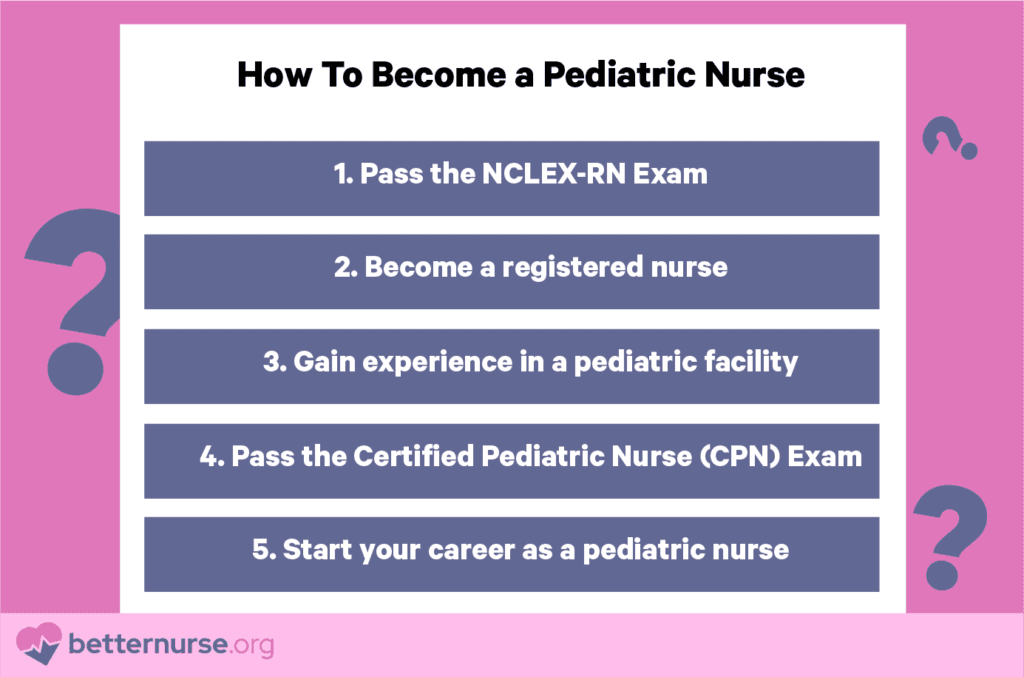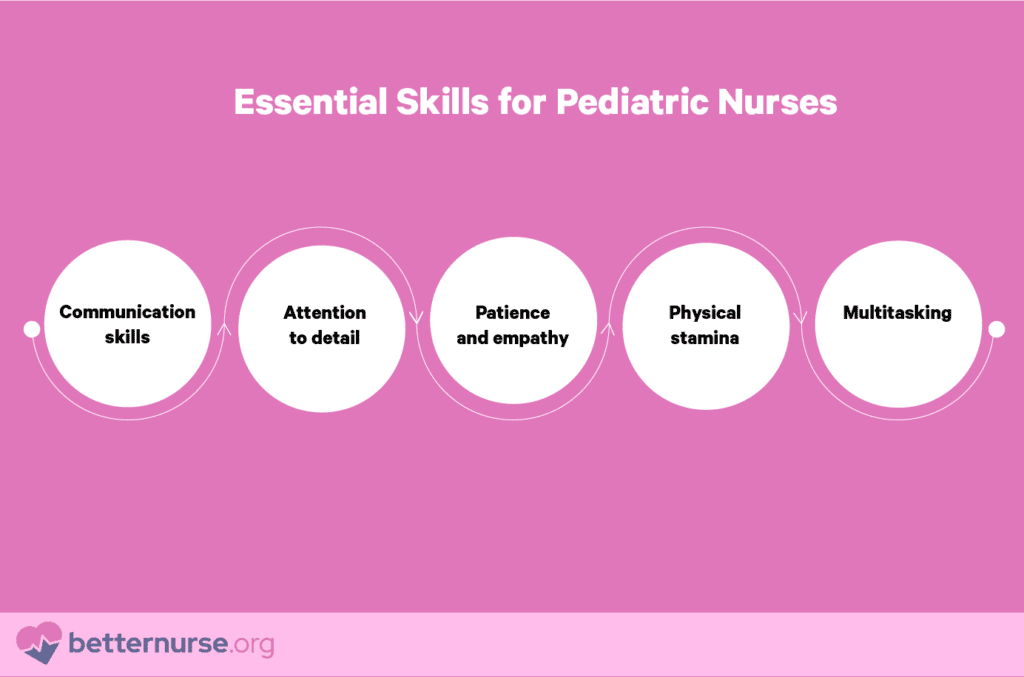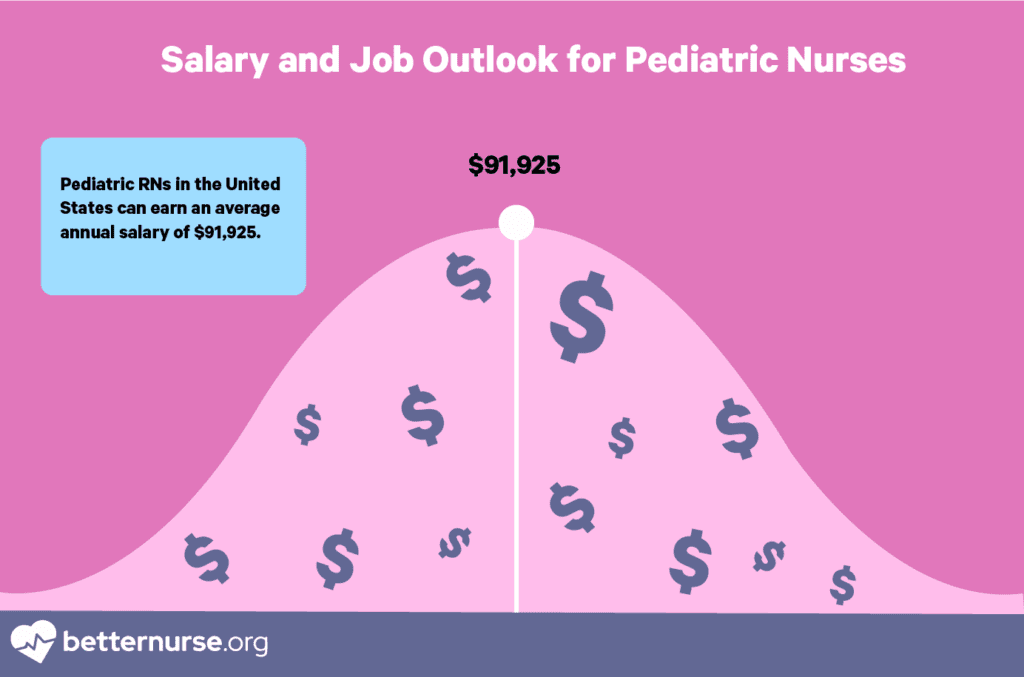Pediatric nurses are registered nurses who specialize in providing healthcare to children, from infancy through adolescence, with the goal of promoting their health and well-being.
Pediatric nurses provide healthcare to children in various settings, including hospitals, clinics, and schools. They are responsible for administering medications and treatments, monitoring and assessing their patients’ physical and emotional needs, and communicating with families and healthcare teams.
Becoming a specialist in pediatric nursing requires dedication, hard work, and ongoing education and training. This article will explore the steps to becoming a pediatric nurse and the essential skills required for success in this rewarding field.
Table of contents
How To Become a Pediatric Nurse

To become a pediatric nurse, one must follow a few crucial steps in terms of education and gaining experience. Here is everything you need to do in order to become a pediatric nurse:
1. Pass the NCLEX-RN Exam
Passing the NCLEX-RN exam is necessary for those wishing to become pediatric nurses. This exam is a comprehensive assessment of the knowledge and skills necessary to practice as a registered nurse (RN). The exam covers topics such as patient care, healthcare management, and ethical and legal issues in nursing.
The exam is administered by the National Council of State Boards of Nursing and is required for RN licensure in most states. By passing the NCLEX-RN exam, individuals demonstrate competence and readiness to practice nursing in various healthcare settings.
2. Become a registered nurse
RNs provide patient care, educate patients and their families, and coordinate patient care with other healthcare professionals. They are responsible for assessing, planning, implementing, and evaluating patient care plans.
To become an RN, individuals must complete a nursing degree program, either an Associate Degree in Nursing (ADN) or a Bachelor of Science in Nursing (BSN) program, and pass the NCLEX-RN exam. These programs provide comprehensive education and training in nursing concepts, clinical skills, and patient care.
RNs can work in various healthcare settings, including hospitals, clinics, and private practices, and care for patients of all ages. Gaining experience as an RN provides individuals with the foundation and skills necessary to specialize in pediatric nursing.
3. Gain experience in a pediatric facility
Gaining experience in a pediatric facility is crucial to becoming a pediatric nurse. Pediatric facilities provide specialized care to infants, children, and adolescents and offer unique opportunities to gain hands-on training in caring for pediatric patients.
Working in a pediatric facility allows one to develop specialized skills, such as administering medication, providing emotional support to patients and their families, and performing procedures specific to pediatric care.
Lastly, working in a pediatric facility gives you a deeper understanding of child development, common pediatric illnesses and diseases, and the unique challenges of caring for pediatric patients.
4. Pass the Certified Pediatric Nurse (CPN) Exam
Passing the CPN exam is optional for those wishing to become pediatric nurses. Certification as a CPN demonstrates expertise in caring for children and their families and can enhance career opportunities and earning potential.
The CPN exam evaluates knowledge and skills specific to pediatric nursing, including child development, growth and nutrition, common pediatric illnesses and diseases, and pediatric pharmacology. To take this exam, you must meet specific eligibility requirements, such as holding a current RN license and having a certain amount of pediatric nursing experience.
While certification as a CPN is not required to work as a pediatric nurse, it is a recognized credential demonstrating a commitment to excellence in pediatric nursing.
5. Start your career as a pediatric nurse
If you’re passionate about pursuing a rewarding career in pediatric nursing, follow these crucial steps to embark on your professional journey. Begin by crafting a well-rounded resume that emphasizes your education, certifications, and pertinent work experience. Additionally, showcase any volunteer engagements or extracurricular activities that demonstrate your dedication to the nursing field.
As you apply for positions, thoroughly research the organization to customize your CV for the particular role you’re targeting. This not only highlights your genuine interest but also demonstrates that you’ve taken the initiative to learn about the organization. Lastly, don’t underestimate the power of networking—connecting with other professionals in the field can significantly boost your chances of discovering potential job opportunities.
Essential Skills for Pediatric Nurses

Pediatric nurses must have several essential skills to provide optimal patient care and work with other healthcare professionals. Some of these skills include:
Communication skills
Good communication skills are a vital requirement for pediatric nurses. These professionals need to effectively engage with patients, families, and fellow healthcare providers to guarantee the best possible care for their young patients. Pediatric nurses must possess the ability to convey complex medical information in an easily comprehensible manner, ensuring that patients and their families grasp the essential details.
Moreover, active listening is a critical component of nurses’ communication toolkit, as it enables them to address the concerns of patients and families empathetically. Providing emotional support in such sensitive situations further solidifies their role as compassionate and effective healthcare providers.
Attention to detail
Attention to detail is crucial for pediatric nurses. They must be able to administer medications accurately and perform procedures, even in stressful situations. Pediatric nurses must also be vigilant for potential complications or changes in a patient’s condition and respond quickly to prevent adverse outcomes.
Patience and empathy
Patience and empathy are two of the most important attributes of pediatric nurses. They must be able to provide emotional support to patients and their families, particularly in difficult or stressful situations. Pediatric nurses must also be able to build trust with their patients and families to create a supportive and comforting environment.
Physical stamina
Physical stamina is necessary for pediatric nurses. They must be able to perform their duties, which may require standing or moving for long periods of time. Pediatric nurses must also be able to lift and move patients as needed.
Multitasking
Pediatric nurses must be able to multitask as they are required to manage multiple patients, procedures, and medications simultaneously while ensuring the safety and well-being of each patient. Pediatric nurses must also prioritize their duties and respond quickly to changes in a patient’s condition.
Career Opportunities for Pediatric Nurses
Pediatric nursing is an exciting field with numerous career opportunities available in a variety of healthcare settings. Whether it be in hospitals, clinics, private practices, schools, or other healthcare facilities, pediatric nurses have a range of options to choose from. Additionally, there are specialized areas within pediatric care, such as neonatal nursing, pediatric oncology, and pediatric intensive care, that one can pursue.
By obtaining advanced education and training, pediatric nurses can further their careers as nurse practitioners, clinical nurse specialists, or nurse educators. Moreover, those interested in research or advocacy can work toward improving the health outcomes of pediatric patients.
With dedication, hard work, and a commitment to ongoing learning and development, you can undoubtedly achieve a fulfilling and rewarding career in pediatric nursing.
Salary and Job Outlook for Pediatric Nurses

Pediatric nurses can expect a positive job outlook in the coming years, with employment opportunities projected to increase by 6% from 2021 to 2031, as reported by the U.S. Bureau of Labor Statistics (BLS).
In terms of compensation, pediatric RNs in the United States can earn an average annual salary of $91,925. However, it is important to note that average salaries may vary based on factors such as geographical location and level of expertise. Click here if you would like to learn more about pediatric nurses’ wages.
The Bottom Line
Becoming a specialist in pediatric nursing requires a unique set of skills and qualities, along with a strong educational background and dedication to continuous learning.
As a pediatric nurse, you will have the opportunity to make a significant impact on the lives of children and their families, providing care and support during some of their most vulnerable moments.
Pursuing a career in pediatric nursing can be incredibly rewarding, but it also requires hard work, compassion, and a genuine desire to make a positive difference in the lives of others. By following the steps outlined in this article and seeking out opportunities for professional development, you can set yourself on the path toward becoming a successful pediatric nurse specialist.

Nurse Luke is a CRNA who specializes in Nursing content and still enjoys a very busy career with Locum, Per Diem and Travel nursing in the greater midwest. He has over 25 years of experience in the healthcare field and received his CRNA masters degree from the Mayo Clinic School of Healthcare. He is passionate about helping nurses explore the options of becoming a travel nurse as well as spending time with his Family.



